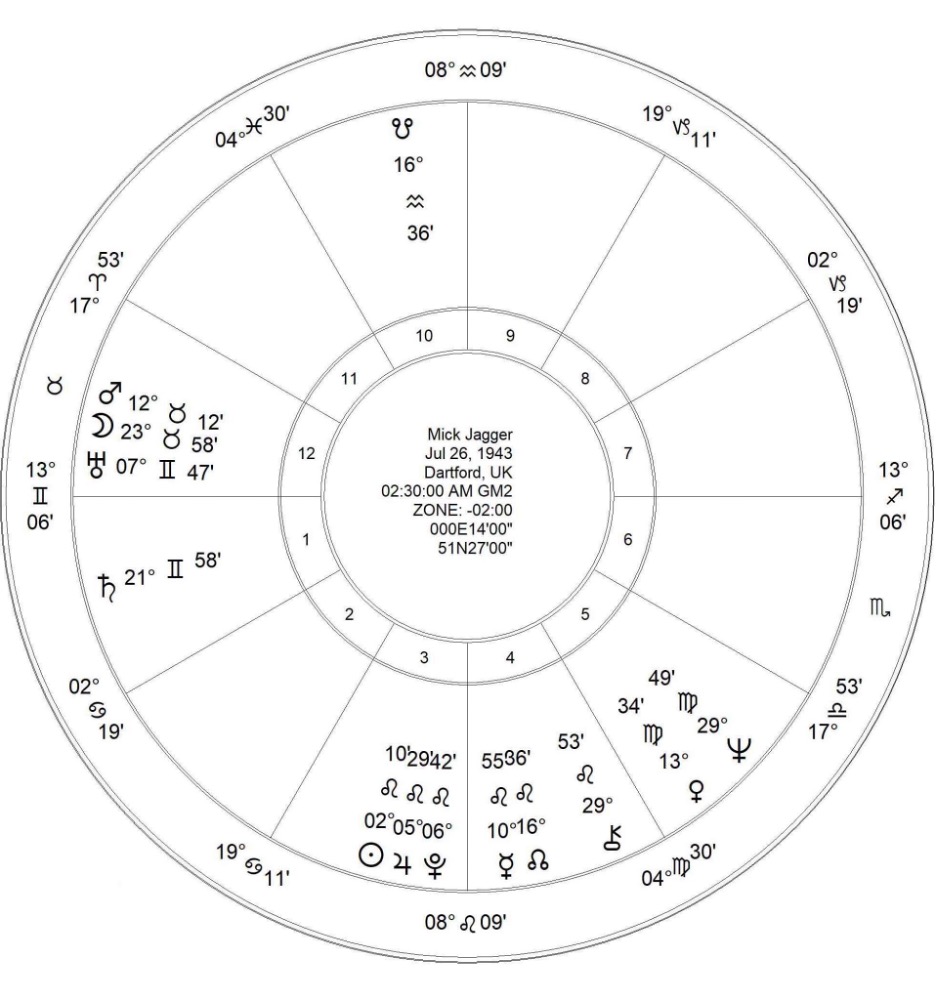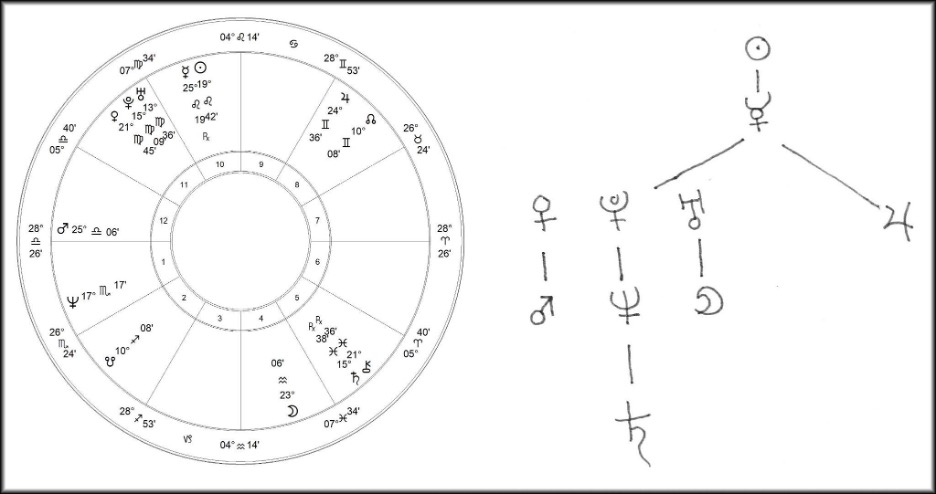Planetray Dispositors
Master’s Musings, November 2023
Planetary Dispositors
NOTE FROM STEVE . . . A few weeks back, Catie shared with me that Cliff Passen had wondered why we never covered the question of planetary dispositors in our FCEA program. As I thought about it, I decided it merited a short handout in our 101 course. As I got into writing it, I realized that dispositors were a richer topic than I had anticipated. Since so many of you are beyond FCEA101 at this point, I’ve decided to let the handout be my column this month so everyone can have a look at it.
From time to time in your astrological reading, you will run into the word “dispositor.” It’s a fancy term for a simple idea – one that’s based directly on the principle of planetary rulership. Say Mercury is in Aries. Since Mars is the ruler of Aries, we would then say that Mars disposits Mercury or that Mars was Mercury’s dispositor. In a nutshell, a planet’s dispositor is the planet that rules the sign the planet happens to be in.
If you think about that for a moment, one further point immediately becomes clear: when a planet is in the sign it rules, nothing can disposit it.
Otherwise all planets have dispositors.
In our evolutionary system we recognize dual rulerships. That means that any planet that’s in Pisces has two dispositors: Jupiter and Neptune. Ditto naturally for planets in Aquarius and Scorpio.
Technically, that’s the basic idea of dispositors right there. Pretty simple really. Let’s talk about what it means.
Basically a planet’s dispositor has a certain degree of influence over it. Understanding the exact nature of that influence can add some helpful nuances to our grasp of the disposited planet’s function – but do keep perspective: understanding the impact of a planetary dispositor is secondary in importance to its basic sign, house, and aspects. Saying that the dispositor “rules over” the planet that it disposits pushes the idea too far. As ever, the dominator tone of the word “rulership” is a medieval hangover that always tends to take astrologers down the wrong road. Rulership is really about resonance, common ground, and mutual influence.
In practice, the dispositor represents a trio of interlocking influence over the expression of the planet which it disposits.
Relative to the disposited planet, the dispositor wields three pressures:
- It represents a Guiding or Governing Principle
- It represents an Overriding Concern
- It represents a Constraining Limitation
Consider the chart of Mick Jagger of the Rolling Stones. We start with something that should be no surprise for a performer of his renown and durability – he has both Venus and Neptune in his 5th house. Both planets are in Virgo, so their dispositor is Mercury, which we find in Leo and in Jagger’s 4th house. Without going deeply into his chart, let’s see how our basic principles apply to him.


Like the 5th house, Leo relates to performance – once again, that’s no surprise. It’s where the 4th house placement of his Mercury enters the picture that everything gets interesting and we really begin to see the signature of a planetary dispositor. The 4th house is deep, internal, and hidden. Those are not the first words to enter our minds when we think of Mick Jagger strutting on the stage!
- But reflect for a moment: is the “sex machine” we see fronting the band the real Mick? Of course not – it’s a performance, quite literally. It is a persona that he has adopted in pursuit of his craft.
I once heard a cute quote from one of Mick Jagger’s daughters when she was young – “Everybody thinks my father is the devil and he lets them think that.” She obviously “had his number” – but probably that was because he had given it to her in the intimate domestic context of 4th house privacy, trust, and confidentiality.
- Applying our principles regarding the dispositor, we can see that throughout Mick Jagger’s long career, A Guiding or Governing Principle has been to stick unwaveringly to the public image he created.
- Meanwhile, An Overriding Concern and A Constraining Limitation in his life has been to keep his real self buried in the 4th house, at least in terms of his public identity as a performer.
As a footnote, presumably doing all that has kept him living in something pretty close to a literal palace – that’s a Leo/4th house signature too, and it brings us closer to conventional astrology.
By the way, it is mission-critical for us as astrological counselors to remember that none of this is intended to be critical of Mr. Jagger. It’s just how a dispositor works. His chart is his path, just like yours. He’s followed it – and in this case it appears that he’s done it very well. How many men over the age of eighty can convince the world that they’re still dangerous sex machines?
Sometimes one planet disposits all the rest of the planets in a chart. For that to even be a possibility, two conditions have to be met. First, there has to be a planet in the sign it rules. Second, there can be no other planets in the signs they rule. If those two conditions are met, there is a chance that the single planet occupying its own sign might be the final dispositor of the chart. To find out, you have to follow the chains of rulership and see if they all lead back to that first planet.
Here’s an example of what that looks like – and note the “dispositor tree” on the right side. That shows these lines of power and how they all trace back, in this case, to the Sun.

- The Sun is in Leo, the sign it rules.
- No other planet is in that “dignified” condition.
- The Sun disposits Mercury, which through Virgo, disposits Venus, Pluto, and Uranus. Through Gemini, that same Mercury disposits Jupiter.
- Venus disposits Mars and Uranus disposits the Moon, while Pluto disposits Neptune – which finally disposits Saturn. That’s everything.
Without knowing about dispositors, we would have no trouble respecting the strength of a Leo Sun in the 10th house! But now we see that reality spelled out even more clearly – how the pressures and possibilities of a Leo “mission” in the world completely “govern, override, and constrain” this person’s life.
Most charts don’t have final dispositors like this, but you’ll often find a long chain that leads back to one single planet. Look at the realities of the person’s life, and you’ll see an elevated level of influence wielded by that planet. Once again, it “governs, guides, and constrains” almost everything – at least almost everything in the realm of the planets it disposits.
As I mentioned, we’ve placed a similar version of this essay as a handout in FCEA101 – very early in our school curriculum, in other words. All in all, it feels right to do that. Dispositors are an elemental piece of astrological theory, one that’s inseparable ultimately from the whole idea of rulership. It feels right that we introduce the word pretty much from the beginning of a person’s astrological studies. My only hesitation is about overloading our 101 students with too many technicalities, especially ones that might not deserve to be up there on equal footing with the foundational basics of signs, planets, houses, and aspects.
The bottom line is that knowing about dispositors is something we should probably hear about in the 3rd grade – but then revisit when we get to college.
